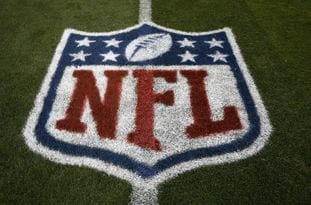The NFL’s new helmet-hitting rule was ratified by league owners in March. (Jack Dempsey/Associated Press)
Ever since the NFL enacted its new helmet-hitting rule in March, players and other observers have wondered how the rule would be enforced by the on-field officials during games and how much effect it would have on how the sport is played.
The earliest of the early returns came Thursday night in Canton, Ohio, as the Baltimore Ravens and Chicago Bears played the Hall of Fame Game to open the NFL’s preseason. There was plenty of talk — and plenty of confusion — about the new rule, which resulted in two penalties being called on the Ravens. The first of those 15-yard penalties came about 4-1/2 minutes into the game, quickly establishing that officials are willing to penalize such infractions.
There were two other personal fouls called during the game for illegal hits that did not fall under the scope of the new rule. That did not stop broadcasters, fans and other analysts on social media from commenting on the new rule in relation to those calls.
It quickly became clear that this will be a learning process for everyone in and around the sport.
“The rule is so simply written but it expands so far, depending on how it’s applied,” former NFL referee Terry McAulay, now a rules analyst for NBC, said on the network’s broadcast of the game.
[Will the NFL’s new helmet-hitting rule change how the game is played?]
The new rule, formulated by the NFL’s rule-making competition committee and ratified by the owners at the annual league meeting, makes it a penalty for any player to lower his head to initiate a hit on an opponent with his helmet. NFL leaders hailed the new rule as a significant player-safety development. But some players have been critical of the new rule and have said they wonder how it will be applied by officials during games.
Players also can be ejected from a game or disciplined by the league with a fine or suspension for egregious violations of the rule.
The first penalty assessed under the new rule came in the first quarter Thursday. Ravens linebacker Patrick Onwuasor was given a 15-yard penalty for an illegal hit with his helmet on Bears running back Benny Cunningham.
Cunningham caught a two-yard pass from Bears quarterback Chase Daniel and was being tackled by another Ravens defender, Anthony Levine. Onwuasor joined the play and lowered his helmet to hit Cunningham. The hit by Onwuasor was a relatively obvious penalty under the new rule. It occurred in an open-field situation and was a comparatively easy call for the officials to make.
Ravens linebacker Kamalei Correa was called for a penalty on a third-quarter hit under the new rule. Again, it was an open-field hit and a violation that was clear to just about everyone.
“Anything with the helmet this year, they’re not gonna let that go,” NBC analyst and former NFL wide receiver Cris Collinsworth said during the broadcast.
But there also was discussion of the new rule after penalties were called Thursday on Bears defensive back Nick Orr and Ravens cornerback Stanley Jean-Baptiste. But both of those calls were announced as unnecessary roughness. Officials apparently were applying the sport’s previously existing rules for illegal hits on defenseless players, not the new helmet-hitting rule, on those plays.
There were no calls under the new rule Thursday on offensive players or on players at the line of scrimmage, although the rule potentially applies to any player in any spot on the field.
The application of the rule will remain a closely watched issue as the NFL preseason proceeds, beginning with a full slate of games next week.
Read more on the NFL:
EA Sports calls omission of Kaepernick’s name from Madden soundtrack an ‘unfortunate mistake’
‘I said what I said’: Cowboys’ Dak Prescott has no regrets about his national anthem comments
A healthy Deshaun Watson is looking to fulfill the promise of a rookie season derailed by injury
Fancy Stats: The two NFL teams best positioned to win future Super Bowls
